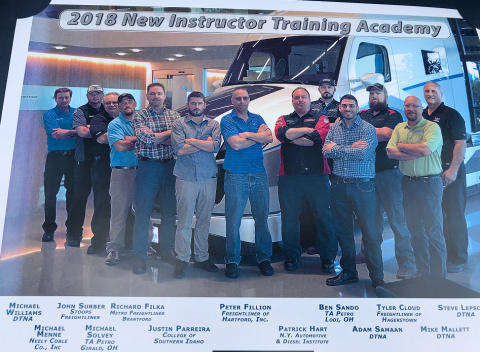What You Can Expect to Earn with an Automotive Technology Degree
Are you wondering what your salary will be when you enter the automotive technology industry? Curious about the job outlook for automotive service technicians and mechanics in the decade to come? Keep reading to learn more about this rewarding career and what you can expect upon graduation from the New York Automotive and Diesel Institute. Automotive Technician Salary According to the U.S. Bureau of Labor Statistics (BLS) Occupational Outlook Handbook, the median pay for automotive service technicians and mechanics was $38,470 per year and $18.50 per hour in May 2016. The bottom 10% of
Enrolling in the NYADI The College of Automotive and Diesel Technology Vocational School
A typical college education consists of four years of courses that cover a variety of subjects. The degree that a student ultimately ends up with tends to be somewhat broad in scope, allowing them to pursue various careers within many different industries. Vocational schools, such as NYADI The College of Automotive and Diesel Technology, offer a more focused, skill-based education for students who want to pursue a specific professional trade career. The Benefits of a Vocational School The following are a few of the benefits of attending a vocational school such as NYADI
NYADI The College of Automotive and Diesel Technology– Proudly Serving Students from the Westchester County Community for Over 20 Years
At NYADI The College of Automotive and Diesel Technology, we “love, love, love” working on any type of motor vehicle. If you share our passion for cars and trucks, perhaps a career in the automotive repair and maintenance industry is the right choice for you. We offer three courses of study, one in diesel, one in automotive repair, and one in collision repair. All our courses are taught by ASE certified instructors. We are a veteran-friendly school authorized to receive educational benefits -- that is, the GI Bill -- from the
5 Reasons Consumers Seek ASE Certified Mechanics
Whether they’re sports car enthusiasts or they spend long hours in reliable family vehicles, consumers seek out ASE certified mechanics to protect their major investment. Here are five reasons that consumers have maintenance, service and repairs done by ASE certified mechanics. The ASE certification has strict mandatory requirements. Besides having to know all eight areas of the ASE Automotive Certification, ASE certified mechanics are required to have full-time, hands-on work experience – the amount of experience needed varies by field – or a mix of training and experience prior to taking
High-Performance Training Takes The Checkered Flag
The world of high-performance engines is filled with the sounds of inline-six engine revs. It’s enough to get your blood pumping. Fortunately, high-performance engine technicians are some of the most in-demand, highly paid technicians in the automotive industry. If you’re considering a job that lets you work with high-performance engines on a daily basis, you first need to acquire the knowledge and skills required to pursue a rewarding career in the fast lane. From The Racetrack To The Streets While you may think of turbochargers and superchargers as the driving force behind
Turn Accidents into Career Opportunities with Collision Training
Every year, the U.S. reports over 6 million motor vehicle crashes. That’s approximately 16,400 crashes per day. Across the nation, there’s no shortage of vehicles needing collision repair. Fortunately, with a degree in Automotive Technology and the Collision Repair Technology program NYADI The College of Automotive and Diesel Technology, you’ll be prepared to perform collision repairs, turning accidents into career opportunities. Collision Repair Technology Program Learn how to properly repair and refinish vehicles after a collision with training from NYADI – a collision repair technician school. This program trains you to become a
Truck and Diesel Techs Keep the Transportation Industry Rolling
Integral to the nation’s infrastructure, heavy-duty diesel trucks require repair and maintenance by technically trained truck and diesel techs. At NYADI The College of Automotive and Diesel Technology, our graduates are prepared to test, diagnose, repair and adjust components in the areas of diesel engines, brakes, steering and suspensions and more, giving them the real-world skills needed to succeed in the automotive and diesel technology fields. Why Does the U.S. Need Truck and Diesel Techs? From construction vehicles to buses to agricultural equipment, diesel technicians inspect, repair and perform maintenance on diesel
How Predictive Collision Systems Impact Automotive Technicians
A predictive collision system, or collision avoidance system (CAS), is an active safety feature designed to reduce the severity of a collision with another vehicle. These systems typically use radar and sometimes lidar, cameras and GPS to detect a potential crash, and they’ll warn the driver or take action autonomously by applying the brakes or correcting the steering. As these systems become increasingly available in vehicles sold across the nation, you may be wondering how they’ll impact the jobs of collision repair technicians. What CASs Means for Collision Repair Technicians According to
Auto Tech vs. Diesel Tech – Which Is Right for You?
While both automotive techs and diesel techs work on vehicles and engines in some capacity, these two careers differ in their job duties and responsibilities. Continue on to learn which career is the right fit for you. Auto Tech Automotive technicians inspect, maintain and repair cars and light trucks and generally work in a repair shop setting. Duties typically required of automotive techs include, but are not limited to: Using computerized diagnostic equipment to identify issues Performing basic maintenance, such as changing oil and rotating tires Repairing and replacing worn parts Performing
NYADI AND DTNA Training Program
Patrick Hart, President of NYADI The College of Automotive and Diesel Technology was invited by Daimler Trucks of North America (DTNA) and New York Freightliner to attend a two week training session at the DTNA headquarters in Portland, Oregon from May 7th through May 18th. DTNA is best known for producing Freightliner and Western Star trucks and Detroit Diesel Engines. The purpose of the training was so that NYADI, the College of Automotive and Technology, can take the next steps in our partnership. The training, New Instructors’ Training Academy (NITA), focusses










